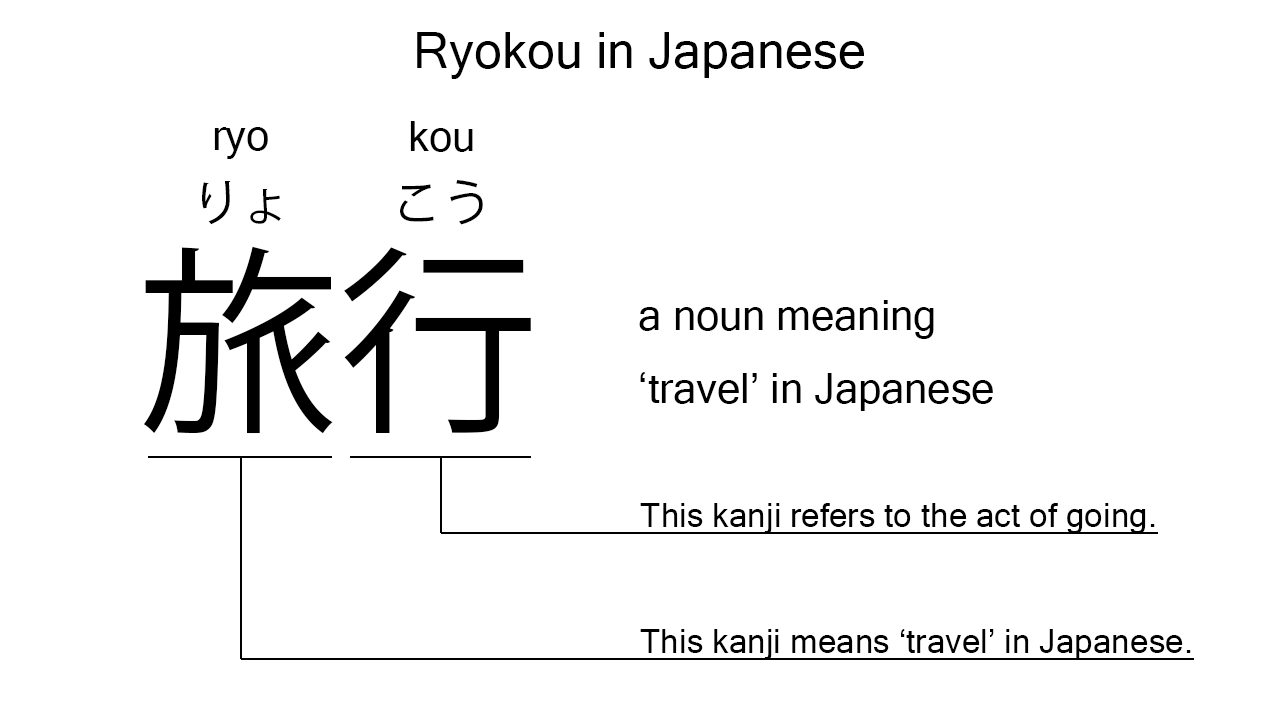What does “ryokou” mean in Japanese?
Native speakers say “ryokou” often to mean ‘travel’ in Japanese. Perhaps, some Japanese learners know this word as it is sometimes used in Japanese conversations. In this blog post, however, I will explain this word in detail based on its kanji expression. And also, I will explain how to use it through example sentences. My explanations would help Japanese learners understand “ryokou” more clearly. Then, let’s get started!
Contents
Definition and meanings of “ryokou”
Let me start with the definition and meanings of “ryokou”.
- ryokou – 旅行 (りょこう) : a noun meaning ‘travel’ or ‘trip’ in Japanese. This can also work as plural. Learn more about Japanese plural.
The definition and meanings are simple and clear. To understand this noun more clearly, however, let me explain its kanji characters in detail, one by one.
What does “ryokou” literally mean in Japanese?
The kanji expression of “ryokou” consists of the following two kanji characters:
- 旅 : a kanji character widely used to mean ‘travel’, ‘trip’, or ‘journey’ in Japanese.
- 行 : a kanji character used to refer to the act of going or visiting. This can also be found in other words like “iku“.
From these two kanji characters, we can understand that “ryokou” literally means a ‘travel to go’ in Japanese. This literal interpretation is very close to the actual meanings.

When we meet new kanji expressions, we should check their kanji characters in detail to understand their meanings clearly and deeply. In many cases, kanji characters tell us a lot about the meanings of the expressions they form. Actually, here, we could get the better understanding of “ryokou” through the detailed kanji check above.
So far, I’ve explained the definition and meanings of “ryokou” together with its kanji characters. Then, let me explain how to use it through the example sentences below.
Example #1: how to say “love traveling” in Japanese
watashi wa ryokou ga suki desu – 私は旅行が好きです (わたしはりょこうがすきです)
I love traveling.
Below are the new words used in the example sentence.
- watashi – 私 (わたし) : a pronoun meaning ‘I’ in Japanese.
- wa – は : a binding particle working as a case marker or topic marker. In the example, this works after “watashi” to make the subject in the sentence.
- ga – が : a case particle used to make the subject word or the object word in a sentence. In the example, this is used after “ryokou” to make the object in the sentence.
- suki – 好き (すき) : the stem part of the na-adjective, “sukina”, which means ‘favorite’ in Japanese. Native speakers, however, often use this as an individual word to mean ‘to like’ or ‘to love’ in Japanese. In the example, this is used to mean ‘to love’.
- desu – です : an auxiliary verb used after a noun or adjective to make it polite. Probably, this is well known as a part of Japanese desu form. In the example, this is used after “suki” to make it sound polite.
This is a typical usage of “ryokou”. In the example, it works together with the case particle, “ga”, to become the object in the sentence. The original meaning of the Japanese sentence is more like ‘I love travel’, but it has been translated more naturally.
Example #2: another usage of “ryokou”
kanojo wa itsumo ryokou wo tanoshimi masu – 彼女はいつも旅行を楽しみます (かのじょはいつもりょこうをたのしみます)
She always enjoys trips.
Below are the new words used in the example sentence.
- kanojo – 彼女 (かのじょ) : a pronoun meaning ‘she’ in Japanese.
- itsumo – いつも : an adverb of frequency meaning ‘always’ in Japanese.
- wo – を : a case particle used to make the object word in a sentence. In the example, this is used after “ryokou” to make the object in the sentence.
- tanoshimi – 楽しみ (たのしみ) : one conjugation of the verb, “tanoshimu“, which means ‘to enjoy’ in Japanese. In the example, it has been conjugated for the better connection with its following word.
- masu – ます : an auxiliary verb used after a verb to make it polite. Probably, this is well known as a part of Japanese masu form. In the example, this is used after “tanoshimi” to make it sound polite.
This is another typical usage of “ryokou”. In this example, it works together with the case particle, “wo”, to become the object in the sentence. When we want to say “travel” or “trip” in Japanese, anyway, this noun is always a very good option.
Summary
In this blog post, I’ve explained the definition and meanings of “ryokou” in detail based on its kanji expression. And also, I’ve explained how to use it through the example sentences. Let me summarize them as follows.
- ryokou – 旅行 (りょこう) : a noun meaning ‘travel’ or ‘trip’ in Japanese. This can also work as plural. These two kanji characters literally mean a ‘travel to go’ in Japanese. This literal interpretation is very close to the actual meanings.
Hope my explanations are understandable and helpful for Japanese learners.